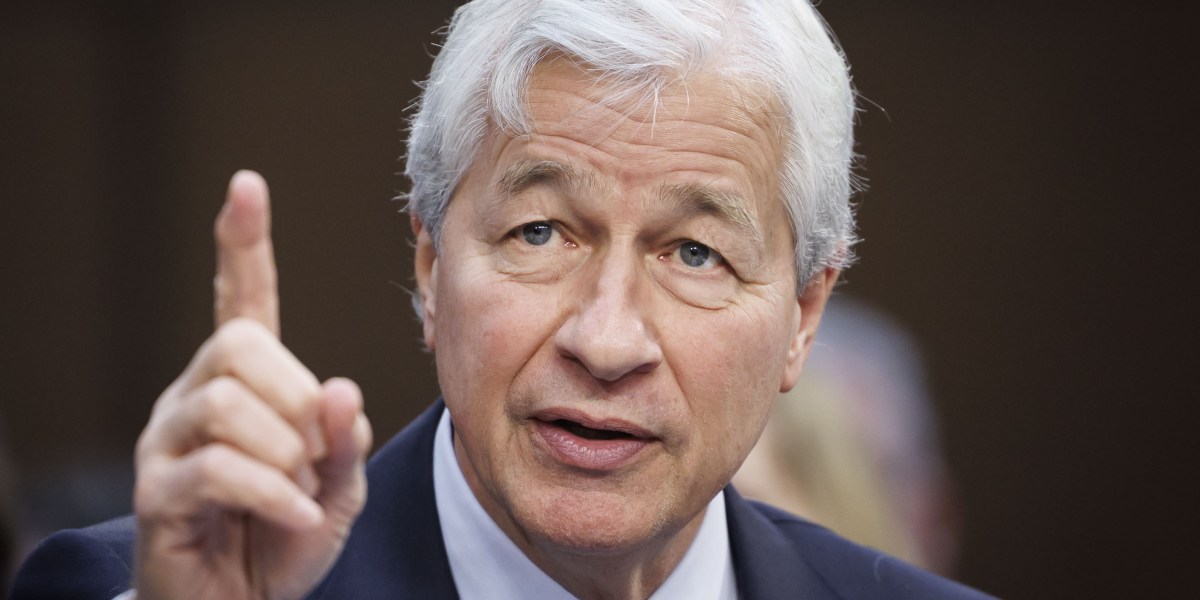- JPMorgan CEO Jamie Dimon insists “there’s nothing wrong with disagreement,” while urging workers to step outside of their lane and challenge the status quo. That mindset will be more important than ever as Donald Trump’s unrelenting tariff campaign sends global stock markets into turmoil. The Wall Street boss also shared management mistakes and tips in his recent shareholder letter.
Staying in your lane is a surefire way to avoid getting into trouble. With workplace incivility and layoffs on the rise, it may be more tempting than ever to keep your head down. But according to Jamie Dimon, it “is a bureaucratic, stupid direction”—and it’s a mindset that won’t get workers or their employers ahead in the current climate.
“Absolutely do not stay in your lane,” the CEO of JPMorgan Chase wrote in his annual shareholder letter published Monday. “Our biggest mistakes happen when people think something is kind of a problem, but they are afraid to raise it in the right room where it might be provocative.”
“There’s nothing wrong with disagreement. Ever.”
The Fortune 500 CEO said every single person in his company’s 320,000-strong workforce is responsible for the $700 billion financial services company’s success.
“You, individually, are responsible. And you know more than you think,” the 69-year-old said, adding it’s why he’s going to ask every worker to email him changes they’d like to see at the firm.
“I’m just asking you to sit down and have a little fun thinking about the stupid stuff we do, the bureaucratic stuff we do,” he added. “You’ve got something to say? You want to add something? You want to check out something? You think something doesn’t make sense? Please bring it up. Too many people stay in their lane.”
In the end, he writes, “complacency, arrogance, bureaucracy and BS kill companies.”
Dimon’s call for out-of-the-box thinking and agility has never been more urgent. As he writes in his shareholder letter, companies must “move quicker, coordinate better, and do things at a faster speed” to navigate the growing uncertainties of tariffs, interest rates, and geopolitical tensions.
The world, Dimon warns, is entering a period of “considerable turbulence,” and today’s decisions may determine which companies sink or swim.
Other management mistakes
Although Dimon slammed siloed workers who stay in their lane as the leading cause of mistakes, he also called out another corporate “sin”: hoarding information. In his annual shareholder letter, the Wall Street CEO didn’t hold back, describing it as a “disease” that undermines success.
Dimon shared an example from his early days as CEO of Bank One to illustrate his point. During a visit to Louisville, he noticed a competitor’s branch across the street operated from 9 a.m. to 5 p.m., while his bank’s hours were 10 a.m. to 4 p.m.
After a quick audit, Dimon discovered Bank One’s branches were, on average, open two fewer hours each day than rival banks—a competitive blind spot hiding in plain sight. The revelation triggered a company-wide overhaul of branch hours.
What stunned him wasn’t just the oversight—it was that “not one salesperson, not one branch manager, not one regional manager, not one district manager” had spoken up. The implication? Employees kept quiet to avoid working extra hours and tanking morale, an unspoken trade-off that cost the business.
Other past mistakes the bank leader says he made include underestimating the importance of cloud technology, leaving the wrong person in a job for too long, and failing “to recognize some early signs of risk.”
5 management tips from Jamie Dimon
Dimon ended the “management learnings” section of his letter with a series of tricks and tools, including writing your own memos, always giving meetings your full attention, and never wasting time re-reading emails:
- Be a skeptic, but not a cynic
“While leaders should celebrate successes, it’s still important to emphasize the negatives and focus on continuous improvement. Be a skeptic but not a cynic. Utilize management techniques that work.”
- Write memos yourself
“I’m a big fan of this one… Don’t always let others write [memos] for you. Similarly, when I ask someone a question, I want to hear directly back from that person, not their boss’s boss up the chain. And if I call that person directly, I want to talk to them. And share all the facts. Don’t hoard facts. The facts don’t lie.”
- Make meetings count
And turning to meetings, if one is required, make it count. I ALWAYS do the pre-read. I give it 100% of my attention. I see people in meetings all the time who are getting notifications and personal texts or who are reading emails. This has to stop. It’s disrespectful. It wastes time.”
- Write your own press releases
“If you’re going to a meeting to present a new product or service, write a press release about it. This exercise forces you to answer lots of questions people are likely to ask. When you write down what you’re going to say, it focuses the mind and helps you explain things better.”
- Action emails immediately
“Work smarter, not longer. Don’t read the same email two or three times. Most can be addressed immediately. And while this all sounds serious, make work fun. We spend the vast majority of our waking hours at work – it’s our job to try to make it fun and fulfilling.”
This story was originally featured on Fortune.com
Source link


 Entertainment8 years ago
Entertainment8 years ago
 Politics8 years ago
Politics8 years ago
 Entertainment8 years ago
Entertainment8 years ago
 Entertainment8 years ago
Entertainment8 years ago
 Tech8 years ago
Tech8 years ago
 Tech8 years ago
Tech8 years ago
 Tech8 years ago
Tech8 years ago
 Politics8 years ago
Politics8 years ago






